Bibliography
Books I’ve read, started reading, want to read, given up on reading, or maybe skimmed through that are in any way relevant to this project. Sharing for those who want to read more and study on their own. Current count: 100.
DISCLAIMER: Not comprehensive. Not even representative! Many important books are missing; these are just the ones I have gotten around to looking at. Also, not every book here is good.
Click any title for more commentary, relevant essays, or to find where to get the book.
Jump to a category
Big picture: My top picks · Progress & stagnation · Economic history · Surveys of technology · Intellectual history of progress
Specific topics: Materials & manufacturing · Agriculture · Energy · Transportation · Information · Trade & finance · Health & medicine · Science & Research
Other categories: Historical sources · Anthropology & sociology · Costs & risks of progress · Other histories · Fiction
My top picks
If you just want to read a handful of books to get started learning about progress, here’s where I recommend you start.

Enlightenment Now: The Case for Reason, Science, Humanism, and Progress
Pinker surveys the progress of the last few centuries and argues that it is the validation of reason, science, and humanism: “The Enlightenment has worked.” A great overview of progress and some of its deepest causes. If you only read one book on progress, make it this one.My review: Enlightenment Now: A summary

The Beginning of Infinity: Explanations That Transform the World
The key idea in this book is that all problems are solvable—“anything not forbidden by the laws of nature is achievable, given the right knowledge”—but that there is no end of problems or solutions, just as there is no end to knowledge or to mistakes. Also has an excellent treatment of “sustainability.”
Where Is My Flying Car?: A Memoir of Future Past
A bold, ambitious vision for the technological future, combined with a historical and cultural analysis of why we aren't getting there faster. Read this to be able to imagine in detail the progress yet to be made—nuclear power, nanotechnology, and of course flying cars—and to get angry at the forces that have held us back.My review: Progress, stagnation, and flying cars

The Rise and Fall of American Growth
A broad, detailed survey of improvements to the American standard of living over the past 150 years, from 1870 to the present. Gordon argues that growth has slowed in the last 50 years and that we cannot expect high growth to return; I agree with the former but disagree with the latter. Read this to understand very clearly how far we've come, not just in terms of inventions but in terms of quality of life.
The Wizard and the Prophet: Two Remarkable Scientists and Their Dueling Visions to Shape Tomorrow's World
A book about two archetypes: the “wizard” is basically a techno-optimist; the “prophet” is an enviro-pessimist. The story is told in large part through the lives of two men who exemplify the two worldviews: Norman Borlaug, founder of the Green Revolution in agriculture, and William Vogt, who helped establish the environmentalist movement. Mann summarizes Vogt’s view as: “Cut back! Cut back! Otherwise everyone will lose!” while Borlaug’s was: “Innovate! Innovate! Only in that way can everyone win!” The book also looks at a handful of issues in agriculture, energy, and water usage in order to further illustrate the difference in these ways of thinking, trying to be fair to both views throughout. Worth reading for Borlaug’s fascinating life story alone.
Progress & stagnation

Progress: Ten Reasons to Look Forward to the Future
A summary of several major areas of human progress, not only in technology, industry, and living standards, but also in society and government. The chapters cover food, sanitation, life expectancy, poverty, violence, the environment, literacy, freedom, equality, and childhood. Many interesting stories and histories; it’s like a shorter version of Enlightenment Now without the connection to underlying philosophical trends.
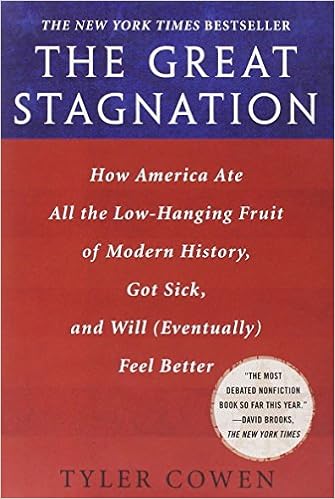
The Great Stagnation: How America Ate All The Low-Hanging Fruit of Modern History, Got Sick, and Will (Eventually) Feel Better
One of the first books to identify the trend of economic stagnation. Cowen agrees with Peter Thiel and Robert Gordon that growth has slowed down, although unlike Gordon he thinks that (as the subtitle indicates) stagnation is temporary.

The Future and Its Enemies: The Growing Conflict Over Creativity, Enterprise, and Progress
Postrel divides the world into the “stasists,” who mostly want to control things and keep them the same, and the “dynamists,” who believe in growth and progress. This cuts across traditional left-right lines. The most interesting idea is that the stasists are actually a coalition of the technocrats, who want to control development in order to guide it and make sure nothing bad happens, and the reactionaries, who are against progress as such. But there is crossover—e.g., the reactionaries often use technocratic methods, such as demanding detailed adherence to bureaucratic standards. Combine with my thoughts on technocracy and the counterculture.

American Genesis: A Century of Invention and Technological Enthusiasm, 1870–1970
A history of the creation of large technological systems of production and distribution, and the social response to those systems. It’s not only about the century of technological enthusiasm, but also about how that enthusiasm went wrong (in my opinion), and how it came to an end. See my review: part 1 and 2.

The Decadent Society: How We Became the Victims of Our Own Success
“Decadent” not in the sense of “overly indulging in hedonistic sensual pleasures,” but in the sense of (quoting from the intro): “economic stagnation, institutional decay, and cultural and intellectual exhaustion at a high level of material prosperity and technological development.” Douthat says that the US has been in a period of decadence since about 1970, which seems about right and matches with observations of technological stagnation. He quotes Jacques Barzun (From Dawn to Decadence) as saying that a decadent society is “peculiarly restless, for it sees no clear lines of advance,” which I think describes the US today.

Factfulness: Ten Reasons We're Wrong About the World—and Why Things Are Better Than You Think
When most people are polled about conditions and trends in the world (e.g., is extreme poverty increasing or decreasing?), they not only get the answers wrong, they do worse than random guessing. That is, they are systematically biased in a wrong direction—a pessimistic direction. The state and direction of economic and social statistics is better than most people realize. In this book Rosling suggests several cognitive biases and other mistakes that cause these misconceptions. Interesting, concise, and very readable, although I found his explanations less than convincing or satisfying. If you are interested in Rosling, better than this book would be to watch his talks “The magic washing machine” and “200 Countries, 200 Years, 4 Minutes.”
Economic history
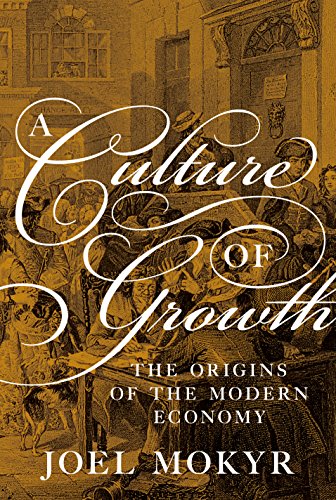
A Culture of Growth: The Origins of the Modern Economy
How the Enlightenment, between about 1500 and 1700, set the stage for the Industrial Revolution. Special attention is given to Francis Bacon and Isaac Newton. For a summary, see Mokyr’s article in The Atlantic, “Progress Isn’t Natural.” (This book was pivotal in the launch of this project.)

The Gifts of Athena: Historical Origins of the Knowledge Economy
What is the relationship between knowledge, especially science, and technological progress? From the preface: “This book is about the proposition that what people knew about their physical environment was of great importance to them and became increasingly so in recent centuries. It is about the history of economic growth, but far more than that, it is the history of economic welfare, of longer, healthier, and more secure lives, of more leisure and material comfort, of reducing mortality, morbidity, pain, and sorrow.” This book brought my understanding of the relationship between science and technology to a new level.

Scientific Culture and the Making of the Industrial West
An history of the intellectual culture in Europe around the 17th to 18th centuries, and how that culture set the stage for the Industrial Revolution. An excellent companion to Joel Mokyr’s books. E.g.: “Purely economic models traditionally assume that if people have coal, capital, and cheap labor they will see it as being in their best interests to industrialize. If they need any specialized scientific or technical knowledge to do that, they will just go out and get it. … What is missing in the story of early industrialization to date is any convincing cultural paradigm—a set of recognizable values, experiences, and knowledge patterns possessed among key social actors—that offers insight into the formation of the industrial mentality of the late eighteenth century.”

Bourgeois Dignity: Why Economics Can't Explain the Modern World
The second book in McCloskey’s famous “Bourgeois” trilogy, arguing that ideas were the cause of the “Great Enrichment” that began in the 19th century: specifically, a new “dignity and liberty for ordinary people”, and especially for innovators. The book not only argues for this thesis, but systematically reviews every other theory that has been proposed for the cause of the Industrial Revolution and the subsequent dramatic increase (by at least a factor of sixteen, and arguably a factor of thirty) in per-capita incomes in the industrialized world.

The British Industrial Revolution in Global Perspective
If innovation is like a product, then it has supply and demand. Joel Mokyr emphasizes supply factors: factors that create innovation, such as scientific knowledge and educated craftsmen, but Allen thinks demand factors have been underrated. This book argues that many major inventions were adopted when and where the prices of various factors made it profitable and a good investment to adopt them, and not before. In particular, he emphasizes high wages, the price of energy, and (to a lesser extent) the cost of capital. When and where labor is expensive, and energy and capital are cheap, then it is a good investment to build machines that consume energy in order to automate labor, and further, it is a good investment to do the R&D needed to invent such machines. But not otherwise.
My review: What if they gave an Industrial Revolution and nobody came?

How the World Became Rich: The Historical Origins of Economic Growth
A book-length academic literature review of economics and economic history work on the key question of what caused the Great Enrichment, why some countries have caught up to the West, and why others have not. Joel Mokyr and Davis Kedrosky have good reviews.

Technological Revolutions and Financial Capital: The Dynamics of Bubbles and Golden Ages
Argues that each “long wave” of technological development has four stages. First there is a stage of experimentation and slow growth. This is followed by a period of rapid growth as people get excited about its possibilities; indeed they get over-excited, leading to “frenzy” and a bubble. The bubble then pops, leading to a crisis and restructuring. The third phase is one of deployment, in which the technology diffuses and growth continues, but now in a more sober way on sounder economic footing. In the last phase, the technology has matured and growth plateaus. Perez argues that the first and third stages are more driven by technologists but in the second and fourth the industry is captured by the financiers. Overall I learned a lot from this but found the framework too Marxist/Hegelian for me (Marxist not in the sense of “advocating socialism” but more in the sense of seeing human thought and action as being conditioned by tools and economic circumstances).
Surveys of technology

The Knowledge: How to Rebuild Civilization in the Aftermath of a Cataclysm
A summary of the technologies that the modern industrial world depends on, the basic principles of their operation, and how one might re-establish them if the world were to suffer some global shock that led to the breakdown of civilization. I have no interest in apocalyptic scenarios (and I’m certainly not a prepper), but this book is a good survey of the key technologies of industrial civilization, and I enjoyed it.

A Brief History of How the Industrial Revolution Changed the World
A general history of the Industrial Revolution. Surprisingly, it’s hard to find good histories of this period; in particular, it’s hard to find concise, one-volume summaries from the beginning of the period to the modern era, that cover the main developments in the whole world (while keeping most of the focus on where the action was, in the UK and then the US). This is the closest one I found.

Napoleon's Buttons: How 17 Molecules Changed History
A mashup of history and chemistry. An episodic book, told in 17 loosely connected chapters, each one about a particular substance or class of substances, from spices to DDT to the Pill. Each chapter tells the chemistry of the substance, complete with diagrams of molecular structure, and its role in history.

Dreams of Iron and Steel: Seven Wonders of the Modern Age, from the Building of the London Sewers to the Panama Canal
Episodic, with each chapter telling a standalone story. I read the one on Joseph Bazalgette and the London sewer system, which was good. For instance, I learned that steam engines were key to the system, pumping sewage from lower levels to higher ones so it can flow downhill. Also, Bazalgette used Portland cement instead of Roman cement, which was controversial at the time but worked out very well.

The Heroic Age of American Invention
A survey of major inventions in the US from the 1830s until World War I, telling the stories of the inventors and what they created. Covers many famous stories such as Edison, Goodyear, Bell, and the Wright brothers, as well as less well-known ones such as Christopher Sholes (the typewriter), Elihu Thompson (electrical transformer), and Samuel Langley (a pioneer of flight before the Wrights).
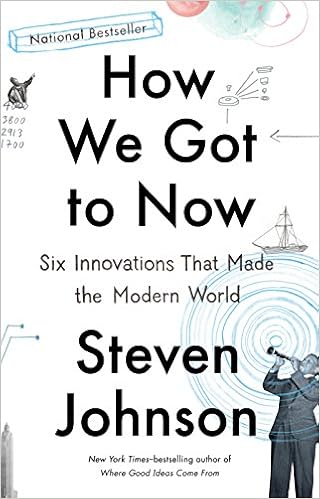
How We Got to Now: Six Innovations That Made the Modern World
A collection of stories of technology innovation. Fairly episodic, but has lots of fun and interesting stories across a broad range of topics, from glass to neon lights to the clean rooms where they make integrated circuits.

An Encyclopedia of the History of Technology
An encyclopedia covering, in brief, just about every subject in the history of technology, compiling the works of a few dozen authors. This one is a tome, weighing in at over 1,000 pages.
Intellectual history of progress

The Idea of Progress: An Inquiry Into its Origin and Growth
Exactly what it says on the tin: a history of the idea of progress, from ancient times to the present. There are many books with this exact title (!), but this is the earliest and best-known.

Progress and Power
Based on three lectures delivered at Stanford in 1935. It’s illuminating about the state of intellectual thought in that era, and in particular the changing idea of progress. Even before World War 2, the concept of progress had been shaken: “The present moment, therefore, when the fact of progress is disputed and the doctrine discredited, seems to me a proper time to raise the question: What, if anything, may be said on behalf of the human race? May we still, in whatever different fashion, believe in the progress of mankind?”
Materials & manufacturing

The Substance of Civilization: Materials and Human History from the Stone Age to the Age of Silicon
A history of materials. I enjoyed this, although it’s not tightly integrated and goes off on not-clearly-relevant historical tangents. Still, many interesting stories about materials. For instance, I learned from this that early glass was opaque; transparent glass is a technological achievement.

Stuff: The Materials the World Is Made Of
Another history of materials. Have only read the intro so far, but it seems well-written in my preferred problem-solution style.

Making the Modern World: Materials and Dematerialization
A concise summary of the materials that are used in pretty much every manufacturing and industrial process, from ancient times to the present. In the later chapters, Smil covers environmental concerns and ways in which we are “dematerializing”: reducing the amount of materials we need to maintain our standard of living.
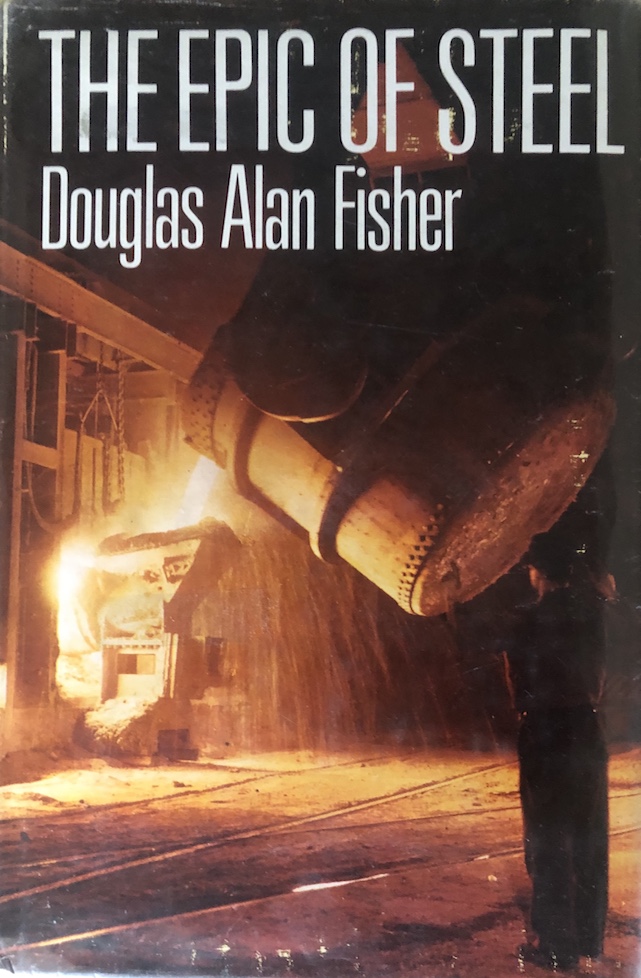
The Epic of Steel
A history of steel from pre-historic times through the mid–twentieth century (when the book was published). Covers smelting, refining, and manufacturing techniques.

Steel: From Mine to Mill, the Metal that Made America
A brief history of steel combined with a tour of a modern steel-making process, as the subtitle says, from mine to mill. Covers ore mining, smelting in multiple kinds of furnaces, and casting and rolling processes.

Concrete Planet: The Strange and Fascinating Story of the World's Most Common Man-Made Material
A history of concrete, which is far more interesting than it sounds. Starting with concrete’s prehistoric origins, the book covers its extensive use by the Romans, the development of different types of cements in the Industrial Revolution, and the invention of reinforced concrete. Stories include the making of the first tunnel under a river, the construction of the famous Sydney Opera House, and the creative use of concrete by Frank Lloyd Wright.

Cotton: The Biography of a Revolutionary Fiber
A history of cotton, from antiquity to the present. Some key topics covered include: different kinds of cotton; the mechanization of the textile industry in the early Industrial Revolution under Richard Arkwright; the Lowell mills; Eli Whitney and the cotton gin; the Civil War; the boll weevil and how it was fought both before and after modern agricultural technology.

Plastic: The Making of a Synthetic Century
A history of plastic, from the earliest experiments in the mid-1800s through the environmentalist backlash in the 1990s. Covers all the major developments, including celluloid, Bakelite, nylon, vinyl, Teflon, PET, and more. I enjoyed this book and gained a new appreciation, nay awe, for plastic and its contributions to the world.

Plastic: A Toxic Love Story
A book about plastic, the objects made from it, and its risks and harms. I became interested in this book through a Scientific American article excerpted from it. That article contained a lot of fascinating history, but I was disappointed with the book.

The Perfectionists: How Precision Engineers Created the Modern World
A history of precision in engineering, from the first precision-bored cannons and precision machine tools in the 1700s, to modern jet engines, integrated circuits, and LIGO.

Nanofuture: What's Next For Nanotechnology
An introduction to nanotechnology for a general audience, mostly focusing on the incredible potential applications. I’ve been interested nanotech ever since I read Hall’s Where Is My Flying Car? This is the only book on the topic I’ve read, but I am told by a reliable source that it is the best intro.

Flintknapping: Making & Understanding Stone Tools
A guide to how stone tools are made, written for both the archaeologist and the hobbyist. Probably much more than you want to know about stone tools, but it helped me understand one of the first technologies.
Agriculture

A History of Agriculture in Europe and America
A comprehensive history of Western agriculture, including many social/political issues bound up with it. Written in 1940, so probably out of date.

Food: A Very Short Introduction
As the title suggests, this is a small book briefly covering a handful of key topics in food. Unlike most of the books in this bibliography, it is not a history but more of a survey, although it does contain some history.

The Alchemy of Air: A Jewish Genius, a Doomed Tycoon, and the Scientific Discovery That Fed the World but Fueled the Rise of Hitler
The story of the Haber-Bosch process for creating synthetic ammonia, which is crucial for producing the fertilizer needed to feed the seven billion or so people on Earth today. In Hager’s phrase, it turns air into bread. It’s also the story of the lives of the men who created it, and its consequences for world agriculture and for Germany during the World Wars.
My review: Turning air into bread

Organic Chemistry in Its Applications to Agriculture and Physiology
A historic book that pulled together work from multiple scientists to explain what elements plants need and where they get them from. This understanding was the scientific foundation for synthetic fertilizer.

Famine: A Short History
Perhaps the definitive modern reference on famine. In addition to cataloguing many instances of famine throughout history, it had an informative and horrifying chapter on the psychological effects of famine—how it can drive order to break down in society, parents to abandon children, and people to sell themselves into slavery.
Energy

Energy: A Human History
A history of the industrial use of energy, from the rise of coal mining in 1600s England to the atomic age. Covers topics including the early oil and gas industry, the first pipelines, the first hydroelectric plant at Niagara Falls, and the development of nuclear power.

The Most Powerful Idea in the World: A Story of Steam, Industry, and Invention
A history of steam power from the 1600s through the steam engines of Thomas Newcomen and James Watt and the later developments that led to steam locomotives. Along the way, it also covers the origins of patent law, which is the real “most powerful idea in the world.”

Empires of Light: Edison, Tesla, Westinghouse, and the Race to Electrify the World
The story of the Electricity Wars of the late 1800s, focusing on Edison, Tesla, and Westinghouse. This was the period early in the electrical industry in which AC and DC—alternating vs. direct current—were competing to be the standard for power distribution. The story ends around the time of the first hydroelectric power plant, at Niagara Falls in 1895.
My review: Why AC won the Electricity Wars

The Prize: The Epic Quest for Oil, Money & Power
A global history of oil, from the beginning of the industry in the late 1850s to today. The first part of the book is mostly about the early oil industry; by the end, it’s mostly about geopolitics.
Transportation

Longitude: The True Story of a Lone Genius Who Solved the Greatest Scientific Problem of His Time
The story of John Harrison and the invention of the marine chronometer, a timepiece accurate and hardy enough to be used on ocean voyages. The chronometer solved the problem of finding longitude at sea, a grand challenge problem of the 1700s.

Sextant: A Young Man's Daring Sea Voyage and the Men Who Mapped the World's Oceans
Written by a man who sailed a small yacht across the Atlantic as a teenager, this book combines his recollections of that voyage with the history of marine navigation, and tales from the great British and French explorers of the 1700s who created the modern map of the world. Covers the sextant (of course), the problem of longitude, and the voyages of Captain Cook, Bligh (who suffered the mutiny on the Bounty), Vancouver, and Slocum.

The Life of George Stephenson and of His Son Robert Stephenson
George Stephenson is considered the father of the locomotive, and this is a detailed history of the origins of the railroads in Britain. Many interesting technical details—for instance, one of Stephenson’s innovations was the “steam blast”, in which the steam exhaust is directed into the chimney of the engine to increase the draft and thus stoke a hotter fire.

Nothing Like It In the World: The Men Who Built the Transcontinental Railroad 1863-1869
A history of the transcontinental railroad, built in the US in the 1860s. Two private companies built the road, one from Sacramento building east, and one from Omaha building west; they met in the middle near the Great Salt Lake, Utah. I enjoyed this book, although like many history books I found it to have too much needless detail, while simultaneously omitting many details I thought would be interesting.

The Box: How the Shipping Container Made the World Smaller and the World Economy Bigger
The story of the shipping container—those standard metal boxes you see on cargo ships, trains, and trucks, carrying goods around the world and integrating the global economy. It describes what the shipping industry was like before the container, in particular, how inefficient and expensive shipping was; how the container got started in the 1950s; and how it eventually, over decades, completely reconfigured the global supply chain.
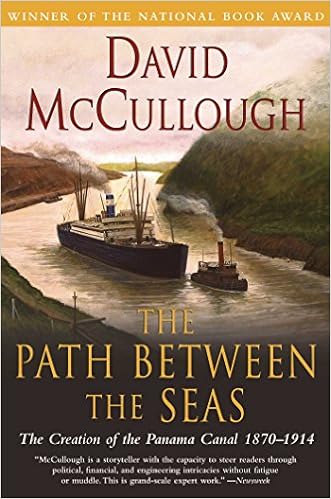
The Path Between the Seas: The Creation of the Panama Canal, 1870-1914
The story of the creation of the Panama Canal. Covers the original, failed attempt by a French private company, the political revolution in which Panama gained independence from Columbia, and the successful construction of the Canal by the US Army.
My review: The 13th labor of Hercules

The Great Bridge: The Epic Story of the Building of the Brooklyn Bridge
A history of the building of the Brooklyn Bridge, by one of the most popular writers of American history.

The Wheel: Inventions and Reinventions
A history of, yes, the wheel. And just as importantly, the axle. It turns out there are fundamentally two architectures for wheeled vehicles: either the wheels are fixed to the axle and the whole axle turns, or the axle is fixed and the wheels rotate freely on the end of it. The former is easier to construct, but harder to steer.
My review: Reinventing the wheel

Ninety Percent of Everything: Inside Shipping, the Invisible Industry That Puts Clothes on Your Back, Gas in Your Car, and Food on Your Plate
A portrait of life at sea, focusing especially on the merchant marine. Covers everything from how ships are registered under flags (seemingly obscure and pedantic but bizarrely interesting to a curious geek like me), to the effect of big ships on whales, to pirate attacks and kidnappings.
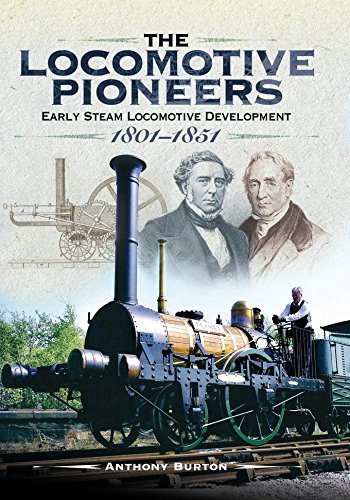
The Locomotive Pioneers: Early Steam Locomotive Development 1801–1851
A history of the early development of locomotive engines. Covers the early attempts of Trevithick, Stephenson, and others; but does not go much into broader railroad topics such as the building of track.
Information

The Victorian Internet: The Remarkable Story of the Telegraph and the Nineteenth Century's On-line Pioneers
A history of the telegraph, short and readable. The optical telegraph, which preceded the electrical version, stands as an excellent example of an idea behind its time. I found it interesting that many observers expected the telegraph to lead to increased understanding between distant peoples and thus contribute to a new era of world peace—another example of the 19th-century over-optimism about the impacts of technology and about moral progress.

The Coming of the Book: The Impact of Printing, 1450-1800
Many interesting details about Gutenberg and the movable-type printing press.
Trade & finance

A Splendid Exchange: How Trade Shaped the World
A history of trade, from the ancient world to the modern. Covers the Middle Ages, when trade was most active in Asia; the European conquest and expansion starting in the 1500s; and the modern debate over free trade vs. protectionism.

Money Changes Everything: How Finance Made Civilization Possible
A history of finance, from ancient Sumer to the present. It covers many topics, from the earliest concepts of compound interest, limited liability, and tradable ownership, up through the development of finance in medieval Europe, the modern corporation as invented in the late 17th century, and 20th century developments such as the IMF and World Bank. It also discusses the parallel history of finance in China, with many similarities but also interesting differences (much more centralized and state-controlled).

The Company: A Short History of a Revolutionary Idea
A history of the corporate form, from its origins in small partnerships through the development of joint-stock companies with limited liability trading on public equity markets.

A History of the Global Stock Market: From Ancient Rome to Silicon Valley
Exactly what it says on the tin: a history of the stock market from its earliest beginnings to the present day.

Against the Gods: The Remarkable Story of Risk
An interesting book, although it doesn’t quite live up to its title. It’s at most a history of financial risk. The first ~half covers the early history of probability and statistics; the rest covers its application to finance, including some diversions into game theory and cognitive biases. Some good science history here, although I thought that his discussion of “regression to the mean”, for example, was hopelessly confused.

Catalogues and Counters: A History of Sears, Roebuck & Company
A history of Sears, Roebuck & Co., covering their origins as a mail-order catalog delivering orders via railroad. Mail-order was one of a few major new retail models developed in the late 1800s, alongside department stores and grocery chains (which in the 20th century evolved into supermarkets). All of these models had as a primary feature lower prices through higher efficiency (including lower financing costs) and cutting out middlemen.
Health & medicine

Louis Pasteur: Free Lance of Science
A biography of Louis Pasteur, covering his major achievements and placing them in the context of the origins of microbiology and the germ theory of disease. I enjoyed this book very much.

Defying Providence: Smallpox and the Forgotten 18th-Century Medical Revolution
The story of smallpox inoculation, the technique that preceded vaccination. Covers in detail the early debates around inoculation, how its value was proven, how it was improved especially by the Suttons, and how it led to Edward Jenner’s smallpox vaccine. It reveals that the famous story of the milkmaids was a myth; the effectiveness of cowpox as a vaccine for smallpox was discovered by inoculation practices.

Miracle Cure: The Creation of Antibiotics and the Birth of Modern Medicine
The story of antibiotics, with a focus on the origins of the industry. Beginning in the era before even the germ theory, it tells how pathogens were first identified, and then cures: from Salvorsan, to sulfanilamides, to penicillin, to broad-spectrum antibiotics. It ends with the expansion of the FDA in the 1960s and the establishment of standards for clinical trials.

The Ghost Map: The Story of London's Most Terrifying Epidemic—and How It Changed Science, Cities, and the Modern World
Steven Johnson’s history of the Broad Street cholera outbreak and John Snow’s pioneering epidemiology work. Clearly, compellingly, and concisely told. I knew that the early sanitation reformers, such as Edwin Chadwick, didn’t necessarily believe in the germ theory and guided their sanitation efforts by sensible qualities such as sight, taste, and smell—I hadn’t realized that Chadwick was a committed miasmatist, so much so that in his crusade to get human waste out of the trenches and cesspools of London, he dumped it into the Thames, fouling that river and actually exacerbating cholera epidemics, the opposite of his stated goal.

Polio: An American Story
A history of epidemic polio in America during the 20th century, including FDR and the origins of the National Foundation for Infantile Paralysis, Jonas Salk and the first vaccine, and his rival Albert Sabin and his alternate vaccine, developed later (both are in use today).

Germ Theory: Medical Pioneers in Infectious Diseases
A history of the development of the germ theory in medicine. Covers the earliest “humoral” theories of Hippocrates and Galen, Avicenna and Fracastoro in the Middle Ages, Leeuwenhoek and his microscope, Jenner and his vaccine, Semmelweis and hand-washing, the amazing accomplishments of Pasteur and Koch, Lister and antiseptics, Erlich and antibiotics.

Smallpox: The Death of a Disease: The Inside Story of Eradicating a Worldwide Killer
The memoirs of D. A. Henderson, who led the World Health Organization’s effort to eradicate smallpox.
Science & Research

Inventing Temperature: Measurement and Scientific Progress
A fascinating story about the development of the thermometer, which turns out to be much more challenging than just putting a drop of mercury in a glass tube and painting a ruler on it. This book combines history and philosophy of science in a way that is similar to what I am trying to do on this blog for technology, in which the history grounds and informs the philosophy, and the philosophy guides and interprets the history.

Scientists Against Time
The official history of the OSRD (Office of Scientific Research and Development), the military research organization created during World War 2. I picked this up in the early months of the covid pandemic, so I was focused on the chapter relevant to medical research: penicillin, antimalarial drugs, blood handling and substitutes, and better pest control (insecticides and rodenticides). Other chapters cover many more technologies, such as the DUKW and the proximity fuze. A case study in how R&D can make progress fast.

Pieces of the Action
The autobiography of Vannevar Bush, one of the most important research leaders of the 20th century. Read this for a first-hand perspective on some of the most important events of that century, from someone who was deeply involved at the highest levels.
My review: Highlights from the memoirs of Vannevar Bush

Pasteur's Quadrant: Basic Science and Technological Innovation
A book arguing that “basic” and “applied” research are not opposed, but orthogonal. “Pasteur’s quadrant” refers to research that is both “inspired by the quest for fundamental understanding” and simultaneously “inspired by considerations of use”.
My review: Pasteur's quadrant
Historical sources

The New Organon
In addition to the parts everyone knows (“knowledge is power,” “nature to be commanded must be obeyed,” etc.), most of the book is devoted to explaining a long list of specific ways that scientists should observe nature and types of evidence they should collect. In some ways he is amazingly prescient (he figures out, essentially correctly, that heat is a form of motion); in others he is surprisingly behind (he rejected the geocentric theory as late as the 1620s). Most relevant to my current work is his argument for why we should expect progress to be possible: he cites previous inventions and discoveries, including the compass, gunpowder, and the printing press, and extrapolates from these to imagine that there are more inventions waiting to be discovered—which there were.

An Essay on the Principle of Population
I came out of this with a new respect for Malthus. His prediction that agriculture could not improve exponentially, although very wrong, was not really the point of the book. Rather, the point was to discuss how society should deal with the resulting challenge. Further, he was not a doomsayer, but rather a moralist—his main recommendation was that young people marry later, in particular waiting until they are sure they can support children.

Philosophical Letters: Or, Letters Regarding the English Nation
I’ve read a few of these so far, in particular the letter on smallpox inoculation, indicating that the practice was well-known in England by the time of this writing in the 1730s. Also interesting were chapters on Bacon, Locke, and Newton. (I learned from this that that the fact that light travels at a finite speed was first demonstrated in the 1600s—and the first estimate of its speed was only 26% lower than the modern value.)

The Communist Manifesto
Unlike Das Kapital, you can read this is one sitting. I learned less than I was hoping for about Marx’s critique of capitalism; I learned more than I expected about his critique of all other socialists.
Anthropology & sociology

The Ascent Of Man
The book version of the famous television series by the same name. Bronowski looks at the development of human civilization from nomadic tribes to modern science.

The Better Angels of Our Nature: Why Violence Has Declined
The story of how and why the world has gotten safer and more peaceful, from tribal societies to today, thanks to the forces of government, commerce, and reason.
My review: The most peaceful time in history

How We Got Here: From Bows and Arrows to the Space Age
A history of the social and cultural factors that led to our species’ development from primitive tribes to the modern world. Being an anthropologist who spent many years living in tribal societies, Hallpike puts special emphasis on these tribes and devotes the first several chapters to them, but he also covers the development of the state, of religion, and then of science and industry.

Guns, Germs, and Steel: The Fates of Human Societies
A sweeping historical book attempting to explain what the author sees as the “broadest pattern” of humanity’s ~12,000 years of history since the dawn of agriculture and settled societies. Describes how civilizations evolve basic features such as agriculture, writing, and government, and puts forth a theory for why these evolved faster on some continents than others.
My review: Continental axes and the roots of progress

Before the Dawn: Recovering the Lost History of Our Ancestors
Covers what is known about the earliest hominins, from the first stone tools used by the ancestors of our species millions of years ago; to the first glimmers of more abstract conceptual thought tens of thousands of years ago, as evidenced by art and religion; to the beginnings of settled societies and agriculture. The book relies on relatively recent developments in DNA sequencing to piece together this prehistoric timeline.
My review: The beginning

The Anthropology of Childhood: Cherubs, Chattel, Changelings
I haven’t read the book yet, but I read a very interesting highlights post. My conclusion: children today get far more love, attention, and developmental help than those in primitive societies.
Costs & risks of progress

The Making of the Atomic Bomb
The definitive, Pulitzer prize–winning account. I learned new things about the development of nuclear physics and of the industrial and managerial challenge of building and testing the bomb. For instance, creating the first critical pile of uranium was a serious technical challenge even after the basic physical theory had been worked out (you have to get very pure materials, build it in just the right shape, etc.) Another challenge was creating the critical mass quickly enough to release the energy all at once: put the pieces together too slowly, and the reaction fizzles out. The implosion method that accomplished this for the plutonium bomb was tricky: the charges had to be placed very precisely to get a uniform shell of inward force. The book also presents both the abject horror of the bomb’s effects on Hiroshima, and also the reasons why the US felt they had to use it—a fair treatment in my opinion.

Human Compatible: Artificial Intelligence and the Problem of Control
About AI risks and safety. In a nutshell, Russell’s idea is that when we design advanced AI, we should program into it (1) that its purpose is to achieve human goals, and (2) that it is uncertain about what those goals are. This will cause the AI to inquire about what we would like, offer us choices, defer to us, and even allow us to shut it down.

The Johnstown Flood
McCullough’s first major work of popular history, it’s the story of a dam that broke and destroyed a Pennsylvania town in the late 1800s.

IBM and the Holocaust: The Strategic Alliance Between Nazi Germany and America's Most Powerful Corporation
IBM supplied the Nazis with specialized punch-card machines that ran their census (to identify the Jews) and that ultimately managed the operations of the concentration camps. Argues with some convincing evidence that Watson Sr. was complicit in this and was in fact a fascist sympathizer. Technology is not always used for good.
Other histories

The Control of Nature
Three stories: dams and levees to control the flow of the Mississippi River, the 1973 Eldfell eruption in Iceland, and landslides in the San Gabriel Mountains near Los Angeles. It’s fascinating to reflect on how nature is truly indifferent to human needs. Even something we take for granted, such as the course of a river, has to be actively, artificially maintained if it matters to humans. Highly recommended; McPhee is an excellent writer.

More Work For Mother: The Ironies Of Household Technology From The Open Hearth To The Microwave
A history of domestic technology and housework. Lots of good info in here about, e.g., the transition from the open-hearth fireplace to the dedicated cook-stove to the gas/electric range; and on the evolution of the washing machine. Cowan says that while all of this technology improved the labor productivity of housework, and reduced its physical burden, it did not reduce the number of hours women had to devote to housewifery, nor release them from that role.

The Power Broker: Robert Moses and the Fall of New York
Moses was the quintessential technocrat, figuratively and literally bulldozing others to drive his plans through—for parks, roads, housing, etc. A good case study in technocracy and the reaction to it.

Leonardo da Vinci
I learned a lot about da Vinci’s life but I still don’t quite understand why he was known as anything other than a painter, since his inventions didn’t go anywhere and his treatises on anatomy, etc. were never published. Mostly this got me thinking about how curious and inventive people like Leonardo were at the time, and why they didn’t make a lot more progress on practical inventions.

Only Yesterday: An Informal History of the 1920s
Published in 1931, so it’s a look back at times that had just passed. A very interesting contemporary perspective.

Masters of the Universe: Hayek, Friedman, and the Birth of Neoliberal Politics
Picked this up as part of some research on social change and intellectual movements—as I strategize about the progress movement, it makes sense to apply my historical approach at the meta-level.
Fiction

Lest Darkness Fall
A sci-fi classic about an archaeologist who is zapped back in time to just after the fall of the Roman Empire, and who makes it his quest to prevent the Dark Ages.